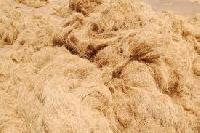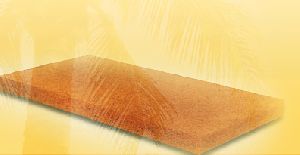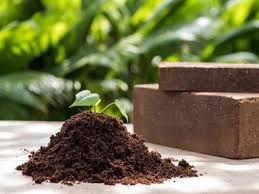
PVC Backed Coir Matting Roll
90 Per Square Feet
100 Square Meter (MOQ)

Coir Fibre
Get Price Quote
We supply coir fiber to all region.
Best Deals from Coir Products

Coco Pith Blocks
Get Price Quote
Cocopeat (also known as coir pith, coir fiber pith & coir dust) is a byproduct in the process of decortication of the coconut husk to make coir fiber. Due to low levels of nutrients in its composition coco peat is usually not the sole component in the medium used to grow plants. When plants are grown exclusively in coco peat it is important to add nutrients according to the specific plants needs. The cocopeat powder thus obtained is seived washed dried and finally compressed in to blocks or briquettes. Cocopeat block normally comes in 5Kg block.Features : Potting Mix Suppliers Green Houses Hydroponic Growers Nursery and Garden Center Professionals Seedling Nurseries Lawn and Golf Course Constructors Horticulture and Floriculture Applications

Coir Peat Blocks
Get Price Quote
The company is an eminent Supplier and Exporter of Coir Peat Blocks. The Coir Blocks we make available are the best growing media for plants. These blocks store, retain and release moisture and nutrients over extended period of time and thus ensuring optimum growth of plants. Peat Blocks offered by us are widely used in agriculture and horticulture applications. One can obtain these at market=leading rates from us.

Coir Poles
Get Price Quote
We are the main supplier of this product.

Coco Peat
Get Price Quote
Coco Peat (Compressed Coir Pith) – Low EC Dimension 30X30X10 Cm Unit Weight 5 Kg EC (1: 5 test) Below 1.0 mS/cm (Low EC) PH 5.5 to 6.5 Moisture 10-15% Expansion 70 to 80 litres Compression 1:5 Ratio Cocopeat is the binding material that comes from the fibre portion of the husk and is also known as Coir pith or Coir dust is a by-product of extracting coir fibre from the husk of a coconut. The coir dust is washed, heat treated, screened and graded before being processed into various Cocopeat products for horticultural/agricultural applications and as industrial absorbent. The compressed cocopeat is converted into fluffy cocopeat by addiing water. One kilogram of compressed cocopeat will expand to 15 litres of moist cocopeat. The Cocopeat by itself does not have any nutrients for plant growth. Necessary nutrients will have to be added according to the plant that is to be grown exclusively in cocopeat. Cocopeat is also mixed with sand, compost and fertilizer to make good quality potting soil. In horticulture, cocopeat is recommended as substitute for peat because it is free from bacteria and fungal spores and is produced without any environmental damage caused by peat mining. Being a good absorbent, dry cocopeat can be used as an oil absorbent on slippery floors. Cocopeat is also used as bedding in animal farms, poultry farms and pet houses to absorb animal waste so as to keep the farm clean and dry. Uses of Coir Pith Coir Pith is an organic tiny particle which is obtained from coconut husk while separating fibre from husk. The Coir pith is also known as ‘Cocopeat’. 100% organic High water and nutrition holding capacity Enhance strong and healthy root system Good air porosity Perfect growing medium for plants Used in Tomato, cucumber, rose, gerbera, and strawberry plantation. Used in Horticulture and Floriculture Environments Used in green house plantation Benefits of Coir Pith: Multi-purpose Growing Medium Cocopeat is a multi purpose growing medium that provides new opportunities for: Potting Mix Suppliers, Seedling Nurseries, Hydroponics Growers and Golf Green Constructors. Environmental support Cocopeat provides as an organic alternate to rockwool and perlite media without the environmental disposal issues. Hydroponics crop production using Cocopeat makes the opportunity to consistently maximize yield and provide better quality. Excellent water holding capacity Excellent water holding capacity of cocopeat provides a buffer in high temperatures and high crop load demand without compromising air supply. Additionally, it offers high water absorption and retention rate. Root Growth The presence of organic compounds in Cocopeat can results strong root growth compare with other growing medium. In addition it offers some natural resistance to plant diseases, so the plant live span will be long.

Coir Fiber
Get Price Quote
Coir Fiber which we offer is a versatile natural fiber extracted from Mesocarp Tissue, or husk of the coconut fruit. The Coir Fiber, offered by us, is of golden color when cleaned after removing from coconut husk; and hence it is also known as �The Golden Fiber". Our Coir Fiber is the fibrous husk of the coconut shell. Various characteristics make the Coir Fiber quite useful in manufacturing floor and outdoor mats, aquarium filters, cordage and rope, and garden mulch. Features Of Coir Fiber Moth-proof; resistant to fungi and rotProvides excellent insulation against temperature and soundNot easily combustibleFlame-retardantUnaffected by moisture and dampnessTough and durableResilient; springs back to shape even after constant useTotally static freeEasy to clean Structure Of Coir fiber The individual fiber cells are narrow and hollow, with thick walls made of cellulose.They are pale when immature but later become hardened and yellowed as a layer of lignin, is deposited on their walls. Mature brown coir fibers contain more lignin and less cellulose than fibers such as flax and cotton and so are stronger but less flexible.They are made up of small threads, each less than 0.05 inch (1.3 mm) long and 10 to 20 micrometers in diameter.White fiber is smoother and finer, but also weaker.The coir fiber is relatively waterproof and is the only natural fiber resistant to damage by salt water. Varieties Of Coconut Coir Fiber Brown Fiber The fibrous husks are soaked in pits or in nets in a slow moving body of water to swell and soften the fibers.The long bristle fibers are separated from the shorter mattress fibers underneath the skin of the nut, a process known as wet-milling.The mattress fibers are sifted to remove dirt and other rubbish, dried and packed into bales.Some mattress fiber is allowed to retain more moisture so that it retains its elasticity for 'twisted' fiber production.The coir fiber is elastic enough to twist without breaking and it holds a curl as though permanently waved.Twisting is done by simply making a rope of the hank of fiber and twisting it using a machine or by hand.The longer bristle fiber is washed in clean water and then dried before being tied into bundles or hunks.It may then be cleaned and 'hackled' by steel combs to straighten the fiber sand remove any shorter fiber pieces.Coir bristle fiber can also be bleached and dyed to obtain hanks of different colours.White Fiber The immature husks are suspended in a river or water-filled pit for up to ten months.During this time micro-organisms break down the plant tissues surrounding the fibers to loosen them - a process known as retting.Segments of the husk are then beaten by hand to separate out the long fibers, which are subsequently dried and cleaned.Cleaned fiber is ready for spinning into yarn using a simple one-handed system or a spinning wheel. Uses / Applications Brown coir is used in brushes, doormats, mattresses and sacking.A small amount is also made into twine.Pads of curled brown coir fiber, made by needle-felting (a machine technique that mats the fibers together) are shaped and cut to fill mattresses and for use in erosion control on river banks and hillsides.A major proportion of brown coir pads are sprayed with rubber latex which bonds the fibers together (rubberized coir) to be used as upholstery padding for the automobile industry in Europe.The material is also used for insulation and packaging.The major use of white coir is in rope manufacture.Mats of woven coir fiber are made from the finer grades of bristle and white fiber using hand or mechanical looms.Coir is recommended as substitute for milled peat moss because it is free of bacteria and fungal spores. Some Coir Facts Coir is a versatile natural fiber extracted from mesocarp tissue, or husk of the coconut fruit.The husk contains 20% to 30% fiber of varying length.After grinding the husk, the long fibers are removed and used for various industrial purposes, such as rope and mat making.The remaining material, composed of short and medium-length fibers as well as pith tissue, is commonly referred to as waste-grade coir.The waste grade coir may be screened to remove part or all of the fibre, and the remaining product is referred to as coir pith. Physical Properties Ultimate length0.6 mm Diameter/width 16 micron Single fibre Length 6 to 8 inches Density1.4 g/cc Tenacity10 g/ tex Breaking Elongation 30% Moisture regain at 65% RH 10.5% Swelling in water 5% in diameter

Rubberised Coir Sheet
Get Price Quote
The Rubberised coir sheet, gives the required insulation & flexibility to the Spring mattress. Can produce in varying densities from 600 g/m2 upward with thickness 4 - 6 mm upwards to suit customer's requirements. Popular quality is density 1000 - 1200 g/m2 with thickness 10 - 15 mm.

Coconut Fiber
Get Price Quote
We are the main supplier of this product.

coir cut fibre
Get Price Quote
coir cut fibre, Coconut Husk Chips, cocopeat briquettes

Coir Pith Briquettes
Get Price Quote
We are offering coir pith briquettes. Coir pith bricks are produced from the coconut husk and its used aa a potting medium in gardening, farming and flower cultivation. It has a good water retention property to boost the growth of the plants.

COIR BRIQUETTE PITH
Get Price Quote
One can avail quality range of Coir Pith from us. This Coir Pith is available in market in different sizes as per the requirements of the customers. Our product range is used for conditioning of soils in different places. Our team of skilled professionals used high technological specifications in the manufacturing of this product.

Coir Pith
Get Price Quote
Coir Pith, Agro Products, Coconut Milk, Semi Husked Coconuts, Coconut Copra

Coir Fibre
Get Price Quote
Specifications * Color: White and Brown/Golden Brown * Impurities: Below 3% * Moisture Content: 12% to 15% Coconut husk is the outer layer of the coconut fruit. It consists of long fibres, medium length fibres, short fibres, baby fibres and pith (coir dust or coir waste). The process of separating the long, medium and short fibres from baby fibre and pith is called coir fibre extraction process. Fibre Quality: Fibre quality is determined based on the length of the fibre and how well the pith is removed from the fibre. Soaking Process: Soaking husks in water is the main criterion that determines fibre quality. By soaking, the hard portion of the husks get softened; the fibres get loosened and hence fibre extraction becomes easier, fibres don’t get cut a lot thereby sustaining fibre length and pith removal from the fibre is improved to a significant extent. Applications: Based on the fibre quality, coir fibre is used to make 1. yarns used for weaving geo-textiles, floor mats and matting 2. curled ropes used in mattresses and couches 3. brushes 4. coir logs used to prevent soil erosion 5. Needle felt used in rubberized coir mattresses, etc…

Coco Peat Briquette
Get Price Quote
Coco Peat Briquette, Textile, Pressed Components, nut fasteners

Coir
Get Price Quote
Coco Brooms, coco brooms sticks, nagercoil coco brooms, cumbum coco brooms

Coir Pith Block
Get Price Quote
Coir Pith Block, Spanish Pot, coco pith block, Coco Huskchip 5 KG Block

neem mixed cocopeat
Get Price Quote
neem mixed cocopeat, aircondition motors, Monoblock Pumps

Coir Pith
Get Price Quote
Coir Pith, Millet, T Shirt

Coir
Get Price Quote
Charcoal, Coconut Shell, fiber, Salt

Coir
Get Price Quote
Sofa, Seat Covers, Mat, ADHESIVE, rexine, Velvet, Coated Fabrics

Coir Fibre
Get Price Quote
Coir Fibre

Coir Pith
Get Price Quote
Coir Pith, Coconut Powder, Paper Cup Raw Material, Coir Pith Block

Coir Fiber
Get Price Quote
Coir Fiber, Fabric

Coir Fiber
Get Price Quote
Coir Fiber, Coir Pith, Coir Blocks, Coco Peat Blocks

coconut white fibre
Get Price Quote
coconut white fibre, Coconut Shell Charcoal, Coir Pith, Coconut Brown Fibre

Coco Peat
Get Price Quote
dried red chilly, White Chicken Eggs, vermicomposts, vegetable drumsticks

white coir fiber
Get Price Quote
white coir fiber, Coir Fibre, Coco Peat (Coir Pith), Cotton Filter Fabric

Coir Pellet
Get Price Quote
Coir Pellet, Coir Pith, Coir Pith Blocks, Coir Pith Bricks, coir peat bales

Coir Pith
Get Price Quote
Coir Pith, Cotton Yarn Dyed Fabrics, Cotton Woven Fabrics